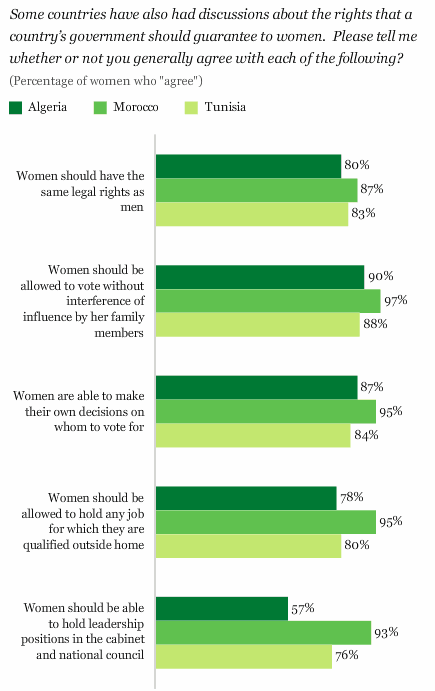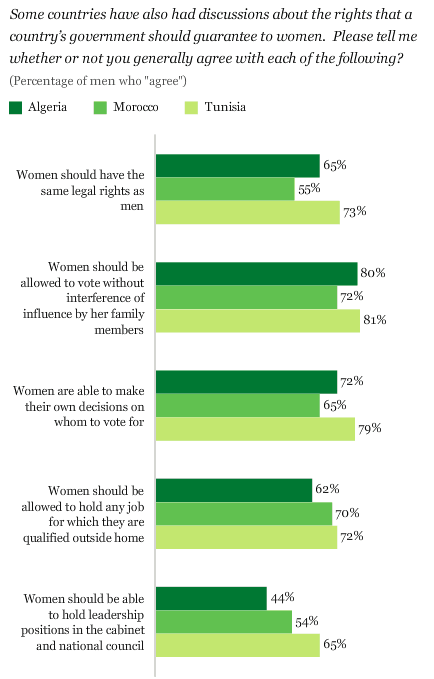WASHINGTON, D.C. -- Results from a Gallup analysis of opinions on women’s rights in three North African countries defy the Western perception that women in the Arab world accept a kind of second-class citizenship status in their societies. Although Algeria, Morocco, and Tunisia differ in how women’s rights have evolved since each nation achieved independence from France about five decades ago, all three populations support gender equality, as is the case in many other countries in the Middle East and the broader Muslim world.
Representing the views of about 80 million people, results from recent Gallup Polls conducted in Algeria, Morocco, and Tunisia show that large majorities of respondents agree that their countries should guarantee women certain rights. Moroccan women tend to be more likely than their Algerian and Tunisian counterparts to favor these rights. Relatively large majorities of men agree with the idea of women’s empowerment in their countries, though not surprisingly, fewer men than women agree.
Extensive Support for Women’s Rights
Large majorities of respondents in each country favor legal, political, and professional freedoms for women:
- Almost 8 in 10 Tunisians (78%), 73% of Algerians, and 71% of Moroccans generally agree that women should have the same legal rights as men.
- More than 8 in 10 Algerians (85%), Moroccans (84%), and Tunisians (84%) believe women should be allowed to vote without interference of influence from family members.
- Eighty-two percent of Moroccans, 76% of Tunisians, and 70% of Algerians agree that women should hold any job outside the home that they are qualified for.
- The right for women to occupy political office is viewed favorably, although noticeably less so in Algeria. Three-quarters of Moroccans, 70% of Tunisians, and just 51% of Algerians say women should be able to hold leadership positions in the cabinet and national council.
Women’s Perspectives
As women in all three countries already have many rights, perhaps it comes as no surprise that so many would agree. At least 8 in 10 women in Morocco (87%), Tunisia (83%), and Algeria (80%) agree they should have the same legal rights as men. The freedom to have professional opportunities is also important for women in these North African countries. Ninety-five percent of Moroccan women and about 8 in 10 women in Algeria (78%) and Tunisia (80%) agree they should be allowed to hold any job for which they are qualified outside the home.

Men’s Perspectives
Even though men in these countries appear less likely than their female counterparts to agree on many of the items tested, Gallup data reveal relatively high levels of support among men to ensure women’s rights on virtually all items. For example, 81% of Tunisian men, 80% of Algerian men, and 72% of Moroccan men agree that women should be allowed to vote without interference from family members. The right of women to hold leadership positions tends to garner relatively low support among male respondents in these countries. Sixty-five percent of Tunisian men, 54% of Moroccan men, and just 44% of Algerian men agree that women should have the right to hold high office.

Gender Split
While the Gallup data show that both women and men in these countries support rights for women, male support is lagging in some cases. In Algeria and Tunisia, the gender gap is relatively narrow on most items. On the issue of giving women the right to hold leadership positions in politics, the gender gap in Tunisia is 11 percentage points and 13 points in Algeria. But there appears to be a wide gulf -- a 39-point difference -- between Moroccan women and men on this question. There is a similarly large 32-point gender gap in Morocco on the issue of guaranteeing that women have the same legal rights as men.
Overall, Gallup findings show clear support for gender equality in North Africa. Further, the poll results may also reflect the different paths each country followed after colonial rule ended. In Tunisia, women received full and equal legal rights at independence in 1956. While Algerian women received the right to vote in 1962, the evolution of women’s rights has been slower than in Tunisia. And Morocco, which is more conservative than the other two North African countries studied, adopted significant reforms to the code of personal law (Moudawana) in 2004 that put greater restrictions on polygamy and gave women equal right to divorce and the freedom to be their own guardians. The juxtaposition of tradition and reform may partly explain why the gender gap on women’s rights is widest in Morocco.
Survey Methods
Results are based on face-to-face interviews with 912 adults in Tunisia and 1,070 in Algeria in August 2006-March 2007, aged 15 and older. In Morocco, poll data were collected in September 2005-December 2005 and results are based on face-to-face interviews with 999 adults, aged 15 and older. For results based on the total sample of national adults, one can say with 95% confidence that the maximum margin of sampling error is ±5 percentage points. In addition to sampling error, question wording and practical difficulties in conducting surveys can introduce error or bias into the findings of public opinion polls.
